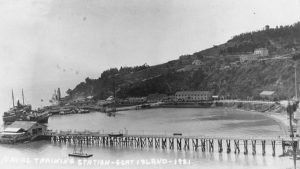The next time Robert Earl Britton writes is on March 31, 1918 from the Naval Training Center on Yerba Buena (Goat) Island in the San Francisco Bay. In the letter he relates the story of its name.
“Goat Island’s real name is Yerba Buena, it was named that by the Spaniards on account of a kind of a plant which grows here noted for its medicinal value. This was in the early days of San Francisco, when the only means of communication with the outside world was by the sailing vessels which came in through the Golden Gate at intervals several months apart.
A trader by the name of Spear who lived on Montgomery street, dealt with the ships on their arrival here and established a very good friendship with the captain of one of the vessels and the captain, wanting to bring something to him for a present, crated up five goats and on his next arrival here presented them to Mr. Spear. As he was a merchant and had no place for the goats he loaded them on a skiff and rowed over to Yerba Buena Island and turned them loose, went on with his business and forgot the present which he had received from the captain.
About the time of the gold rush, there were it is said about 3,000 goats on the island. This was the growth of the flock. There was a good demand for meat at good prices at this time so the market men went over to the island and took goats as they needed them and sold them over the block, saying nothing to Mr. Spear and before he was aware of the fact his goats were all gone.
Thus came the name Goat Island. Spear Street in San Francisco was named after the same man. The Island is repopulated with goats, almost as many, but we only have two legs.”
Britton also tells about the first month at the training center.
“Our stay in the detention barracks, being a thing of the past, I will again act as spokesman for the Edwards county boys and give you folks a brief idea of it.
The things which we were taught in the D. T. could only be spoken of under two headings, that of military discipline and hygiene.
The military discipline we boys knew nothing about and consequently was much different from anything we anticipated.
If we should have acted on the impulse of the moment and let our tempers be master, I am quite sure there would have been a Gold Braid (commissioned officer) or two in the hospital suffering from bruises and black eyes. However this feeling of resentment and anger gradually went away and in a few days we were all beginning to show more true respect for our superiors and now the majority think we have the best officers on the parade grounds in command of our company. Naturally there was a cause for us to get angry and it is also true that the commander intended to get us in that temperament. It was an object lesson, and after we had mastered the lesson he was much more considerate and kind. The lesson was simply this, obedience, no matter how foolish the order may seem, obey it. No matter how overbearing a superior is, respect and obey his authority without hesitation or a word except yes sir, no sir, or aye aye sir.
First your undivided attention, then strict obedience and you have the foundation of military discipline. We boys have the foundation down pat and I am quite sure we will get along good with the balance of our training. I will not go into detail regarding the various orders, rules, instructions, regulations, etc., as to do so would take considerable time and space.
Hygiene, or the science of health, its preservation, and the laws of sanitation, is a subject we boys were as most people of this country are, well informed on.
Although a great many people are more or less negligent in this, I think it is more neglect than ignorance and I can plainly see that neglect is a habit that will soon be forgotten by us boys in the navy.”
(To be continued in #61)

